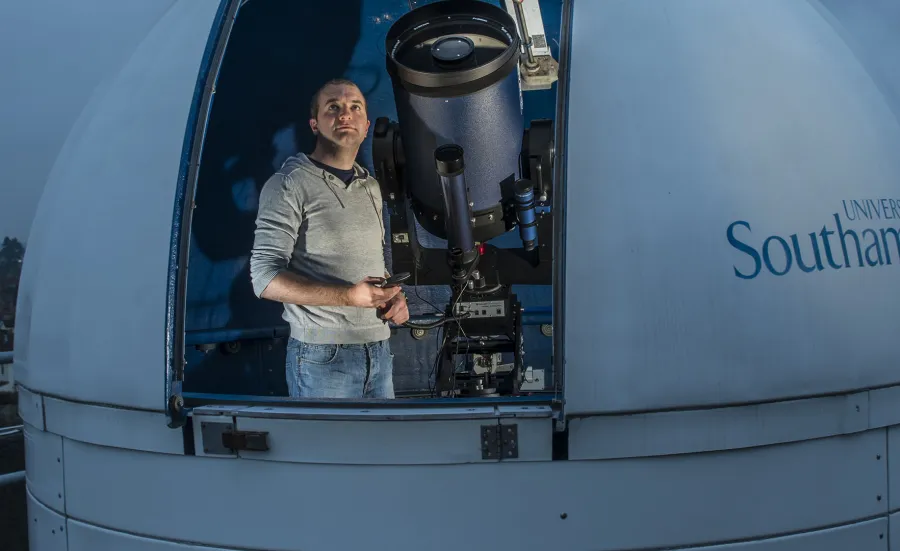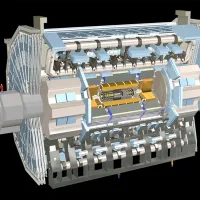Physics and astronomy

Join our rich and vibrant community of researchers. Together we’re understanding the physics behind the fabric of the Universe and how it affects the world we observe.

Join our rich and vibrant community of researchers. Together we’re understanding the physics behind the fabric of the Universe and how it affects the world we observe.

We are ranked in the top 5 physics and astronomy departments in the Russell Group for our research output. Our world-leading status has been confirmed in the Research Excellence Framework (REF) 2021.
You will be supported by a supervisor who'll help you shape your research topic. You'll also join one of our research groups. Being a member of a research group means that interested people are always on hand to hear your ideas, discuss your results and offer help and encouragement.
You'll be able to attend postgraduate lecture courses, classes and research seminars to broaden your knowledge. There will also be opportunities to attend short courses or summer schools, such as Institute of Physics workshops and NATO Advanced Study Institutes. These bring together experts to give lectures and lead discussions.
We'll encourage you to travel for conferences and research collaborations at other large laboratories and world-class observatories, such as CERN and The European Southern Observatory in Chile.
As a newly qualified PhD in Physics, you'll have many career options open to you. Our students head into non-scientific careers, or take up science-based appointments in the UK. Others go one to postdoctoral research, often in the United States, Europe or, increasingly, Japan.
We invite PhD applications to study within the following research areas:
The University of Southampton is pleased to announce that PGR students from EU and Horizon associated countries joining us in 2024-25 will pay the same as UK PGRs for their PhD.
You can either apply for a structured studentship or propose your own PhD idea.
Structured studentships are advertised PhD projects with a title, supervisor, remit and funding already in place. These projects have been set up through collaborations with industry, external partners or they may have been provided through one of several Centres for Doctoral Training which we take part in.
Taking one of our structured studentships will give you access to additional training, conferences and secondments.
We are looking for a student to join an exciting new project in the field of bio-imaging. The project, recently awarded funding of ~£5M, aims to use laser-generated soft X-ray radiation for coherent imaging of nanoscale biological structures.
This is a PhD Studentship in Nanophotonics and Metamaterials with Industrial placement at QinetiQ. This project will explore the design and fabrication of optical metasurfaces for infrared applications using advanced cleanroom nanofabrication and nanophotonics experiments.
This project will develop detectors for topologically structured light at the few- and single-photon level, enabling applications in imaging, metrology, and telecommunications.
Black holes grow by accreting material through a disc which is bright across the EM spectrum. There is good theoretical and observational evidence that the accretion disc will likely be misaligned with the spin axis of the black hole although this is presently hard to pin down due to a lack of models which deal with such an effect.
Black holes in our Galaxy, with masses between 5 and 15 times that of our Sun, form when massive stars explode in supernovae. These dense objects are so compact that not even light can escape their immense gravitational pull. Fortunately, some black holes reside in binary systems with companion stars. When the black hole is close enough to its stellar companion, it draws gas from the star, gradually reshaping it into a pear-like form. This pulled gas doesn’t plunge directly into the black hole but spirals inwards, forming an accretion disk—similar to water swirling down a drain.
This project aims to provide quantum sensors to operate at real world setting to the acceleration noise level of 10-10 m/s2/√Hz based on levitated mechanics. Such sensors will allow to significantly improve our ability to track masses (gravimetry) to monitor their movement and change as well as to detect small magnetic fields (magnetometry).
This project will focus on developing a heterogeneous SiN-GaAs platform for a coherent Frequency-Modulated Continuous Wave (FMCW) LiDAR operating at the 1-µm wavelength band.
Binary systems containing high mass stars evolve through a number of stages, and in many cases can appear as a black hole or neutron star orbiting at a large distance from a ‘normal’ companion star. This is a very long-lived condition which accounts for the vast majority of the millions of binary systems harbouring neutron stars and black holes in our Galaxy. Self-lensing occurs when the binary system is viewed edge-on such that optical light from the companion star is bent towards us and magnified. In the case of microlensing this is a one-off event, whilst self-lensing repeats on the orbital period of the binary.
Fusion reactors, which promise a nearly limitless and clean energy source, require innovative solutions to overcome some of the world’s most significant scientific and engineering challenges. One critical hurdle is the integration of fibre sensors that can withstand ultra-high radiation and extreme temperatures. In this project, you can contribute to the development of sustainable fusion energy, helping to overcome a key challenge for our society and creating a green future for our world.
Perovskite quantum dots show great potential for tunable light emitters. In particular, they can be employed as single-photon emitters, which are key building blocks for quantum communication networks. This project will study the fundamental photophysics behind photon emission of perovskite semiconductor nanoparticles and develop new platforms for quantum technologies.
Quantum photonics is key to develop the next generation of quantum technologies. This project will develop a silicon-nitride platform for visible-wavelength quantum photonics.
The objective of this project is to develop a gyroscope using a micron-sized levitated nanodiamond containing nitrogen-vacancy (NV) defects. We will leverage the properties of the NVs to accurately measure particle rotation, overcoming limitations found in other levitated optomechanics platforms with the goal of delivering a competitive levitated micro-inertial sensor.
Unlike optical telecoms, where amplifiers compensate losses, in the world of Quantum Technology, every photon is precious. This project will create new ultra-low-loss optical components, reducing losses and allowing us to create large, entangled quantum states.
The future Quantum Internet requires efficient devices that store and recall arbitrary quantum states of light. These devices, known as quantum memories, can synchronise entanglement operations between distant locations. This project focuses on the development of rare-earth molecular complexes integrated with silicon nitride integrated photonic circuits.
Current photonic quantum systems suffer from the poor brightness of the single photon sources used as a source for the qubits. The PhD position will explore ways of enhancing light extraction from photon sources and ways to detect meaningful qubit information.
This project aims to study the extreme physical conditions on neutron star surfaces.
This project will explore the radiation pressure of laser light, to levitate, guide and accelerate particles within novel hollow core fibres (HCFs), targeting both fundamental studies and new applications such as radiation sensing and hypervelocity particle acceleration.
Inhomogeneities degrade the performance of atom interferometers used for inertial and magnetic sensing. Optimal Control allows the design of laser pulse shapes that restore interferometer fidelity. This project will extend optimal control design beyond individual pulses to entire interferometer sequences and systems, and explore curious artefacts.
Metal halide perovskite nanocrystals are a promising platform for classical and quantum light emitters. They have great potential for single-photon emitters, which are key building blocks for quantum communication networks. This project combines synthesis, optical characterisation, and NMR studies of metal halide perovskite quantum dots and their optimisation for quantum emitters.
Twisted layers of 2D materials allow for new degrees of freedom in quantum matter, leading to novel phenomena such as unconventional ferroelectricity, superconductivity and topological states. This project explores physics of these phase transitions in suspended membranes, measured by advanced nanomechanical and optical probes, to reveal complex phase diagrams within these unique systems.
Increasingly sophisticated control of quantum systems using classical fields is a crucial tool in emerging scientific and technological applications. At heart, however, control fields are quantum. In this project, you will study how the quantum nature of the field changes the dynamics of the quantum system being controlled.
This project falls within the field of levitated optomechanics, focusing on experiments involving nanodiamond particles with nitrogen-vacancy (NV) quantum defects. The aim is to explore the coupling between the internal spin degrees of freedom of the NV centres and the particle's motion, with the objective of creating macroscopic quantum states.
We offer a wide range of fully funded studentships. We run several of our PhD studentships in partnership with doctoral training centres, meaning you'll benefit from enhanced training and in some cases funding as well.
These studentships:
Doctoral training centres offer fully funded studentships which include:
• a taught first year
• 3 year of PhD research
Find out more about doctoral training centres.
In association with the UK joining the EU Horizon Programme, the University of Southampton will be introducing and applying an EU fee waiver for students joining us from EU and Horizon associated countries. This means that PGR students joining us from 2024-25 will pay the same fees as UK PGR students.
See here for full information terms and conditions
We offer scholarships and teaching bursaries ourselves. Your potential supervisor can guide you on what is available.
If you’re an international student you may be able to apply for a scholarship from your country.
Find out more about scholarships
Once you've found a supervisor, they can help you with potential funding sources. We offer match funding in some cases.
You'll need to state how you intend to pay for your tuition fees when you submit your application.
Find out more about funding your PhD
You may be able to fund your postgraduate research with funding from your current employer or from industry.
You can borrow up to £29,390 for a PhD starting on or after 1 August 2024. Doctoral loans are not means tested and you can decide how much you want to borrow.
Find out about PhD loans on GOV.UK
You may be able to win funding from one or more charities to help fund your PhD.
We charge tuition fees for every year of study. If you're applying for a fully funded project, your fees will be paid for you.
EU Fee Waiver: If your country is part of the Horizon Europe Programme, you will pay the same fees as UK students.
Find out if your country is part of the Horizon Europe programme
2023 to 2024 entry:
| Subject | UK and Horizon applicants | International fees |
|---|---|---|
| Physics and astronomy full time | tbc | £25,500 |
| Physics and astronomy part time | tbc | £12,750 |
2024 to 2025 entry:
| Subject | UK and Horizon applicants | International fees |
|---|---|---|
| Physics and astronomy full time | £4,786 | £26,100 |
| Physics and astronomy part time | £2,393 | £13,050 |
2025 to 2026 entry:
| Subject | UK and Horizon applicants | International fees |
|---|---|---|
| Physics and astronomy full time | tbc | £26,700 |
| Physics and astronomy part time | tbc | £13,350 |
You're eligible for a 10% alumni discount on a self-funded PhD if you're a current student or graduate from the University of Southampton.
As a postgraduate student you'll join one of our research groups. We're ranked in the top five departments for our research output among the Russell Group universities.


Decide whether to apply to an advertised research project or create your own proposal.
It's a good idea to email potential supervisors to discuss the specifics of your project. It's best to do this well ahead of the application deadline.
You’ll find supervisors’ contact details listed with the advertised project, or you can search for supervisors in the staff directory.
You’ll need to send us
The application process is the same whether you're applying for a funded project, or have created a research proposal.
You should have a 2:1 honours undergraduate degree or an appropriate MSc qualification such as Master of Science in physics or a Master of Physics.
If English is not your first language, you'll need an IELTS minimum level of 6.0 with a 5.5 in writing, reading, speaking and listening.
Your awarded certificate needs to be dated within the last 2 years.
If you need further English language tuition before starting your degree, you can apply for one of our pre-sessional English language courses.
Check the specific entry requirements listed on the project you’re interested in before you apply.
Research degrees have a minimum and maximum duration, known as the candidature. Your candidature ends when you submit your thesis.
Most candidatures are longer than the minimum period.
| Degree type | Duration |
| Physics and astronomy PhD full time | 2 to 4 years |
| Physics and astronomy PhD part time | 3 to 7 years |